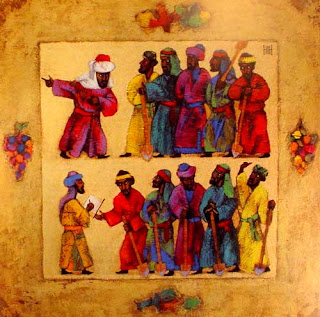 |
| Workers in the Vineyard by Nelle Bube |
Homily for the Twenty-fifth Sunday in Ordinary Time
Why do the good die young?
Why does anyone young die?
Why do scoundrels live long lives?
Why do the innocent suffer?
Why do thieves prosper?
Why does a just, loving, all-powerful God allow these things to happen?
Couldn’t God, shouldn’t God do something about this?
Have you ever found yourself frustrated, disappointed, even angry:
- that God doesn’t always think the same way we do?
- that God doesn’t always do what we
hope, imagine and presume God ought to do?
Apparently, the prophet Isaiah was right:
God’s thoughts and ways are very different than our own.
Sometimes, even when our thoughts and deeds are really very good,
it can seem that God is working from a different set of plans.
We know that the Lord is a champion of justice, fairness and equity:
the whole bible testifies to this -- well, most of the bible!
Then comes a parable like the one we just heard
where nothing seems just, fair or equitable,
where things seem just the opposite!
What’s the Lord thinking here?
What’s his “way” here?
Why the apparent injustice to those who worked all day?
Could be that God sees a much bigger picture here than we do.
- God’s perspective is widely and deeply panoramic,
while ours can be narrow and self-focused.
- God’s way here is scandalously generous
while ours can tend toward the selfish and self-serving.
- God’s time is measured here not in the shifts of a work day
but in the unending eons of eternity.
- What God pays out here can’t be counted in the coin of a daily wage:
such payment, such peace is priceless;
it can’t be earned, only gratefully received
from the One who freely gives it.
The Lord sees from a different perspective
and indeed is working from a different set of plans here.
But the Lord’s purpose is not to confuse us,
much less to keep us from seeing as he sees.
To the contrary!
The Lord is revealing to us here what we can’t see,
what we might not even dare imagine:
that his mercy is pure gift to us, given freely and generously
to any and all who come to receive it.
The story in the parable is designed to turn us on our heads
so that we might begin to see how limited is our perspective.
One lesson of this parable for each of us is this:
“It’s not all about me.”
“It’s not all about me” and what I’ve done and what I deserve.
“It’s not all about me” in comparison to others
who’ve done less or more than I have.
“It’s all about God” and God’s generosity to me and to everyone
who comes, at any hour, for mercy.
If this parable topples our notions of bargaining with God for grace,
our self-constructed merit systems for currying God’s favor,
and our tendency to judge others by our own standards
-- then the parable has done its work.
The truth is, we don’t know why the good die young
and we don’t know why the young die.
We don’t know why scoundrels live long lives,
or why the innocent suffer while thieves prosper.
Nor do we know why a just, loving, all-powerful God
allows these things to happen.
But we do know that at the end of the day
our scandalously generous God will be ready to offer mercy
to all who come with hearts open receive it.
Should this surprise any of us who gather every week
under the outstretched arms of Jesus?
He gave himself for us with a scandalous disregard for his own comfort
so that the poor might be filled with good gifts,
that the abused might have their innocence restored,
that the suffering might find relief,
that the dead, young and old, might have life again,
and that the wicked might find mercy when they come to seek it.
Ponder the depths of the Lord’s overflowing grace,
Jesus, whose life, whose Body and Blood are offered as food
to nourish our hearts’ deepest hungers.
From his sacrifice flows mercy without end
for all who come to the altar,
whatever the hour,
when, by grace,
they hear their Lord calling them at day’s end.
Tweet

Subscribe to A Concord Pastor Comments






No comments:
Post a Comment
Please THINK before you write
and PRAY before you think!